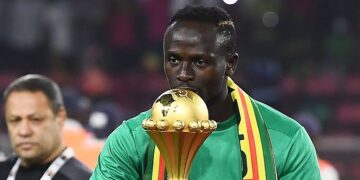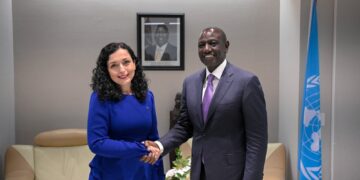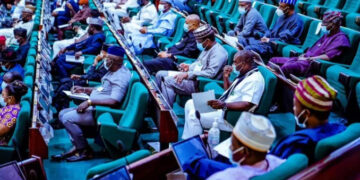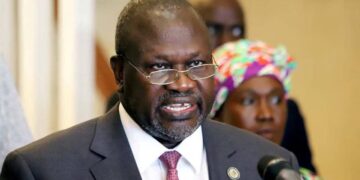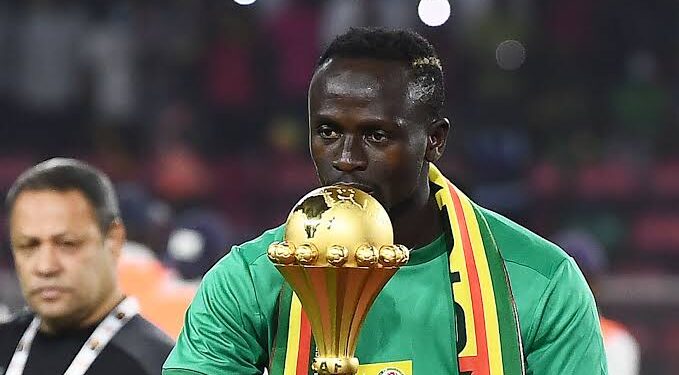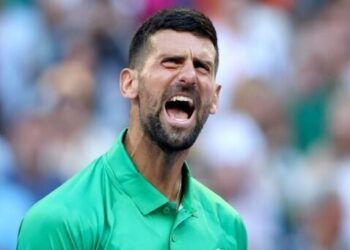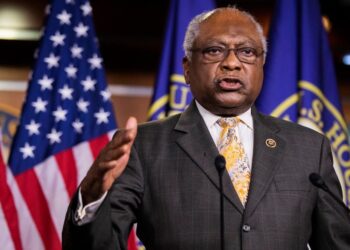By Victor Kanayo
At last, the 2023 Africa Cup of Nations (AFCON) kicks off on Saturday, January 13 with 24 teams competing honours. Senegal are the Defending Champions after winning the tournament in 2021.
Already, all the participating teams including the host and Nigeria’s Super Eagles are in Cote d’ivoire, venue of the 34th edition of Africa’s most prestigious soccer competition?
Anticipated Action In Four Cities
As the African team that made the deepest run at the 2022 FIFA World Cup, all eyes will be on Morocco in Group F.
The Atlas Lions, who advanced to the World Cup semi-finals, have not reached the AFCON final since 2004, and have only clinched the title on one occasion back in 1976.
Hosts Côte d’Ivoire are in a tricky Group A which includes another regular favourite, Nigeria. The 1992 and 2015 champions will be counting on Borussia Dortmund striker Sebastien Haller, who is now back to his best after surviving testicular cancer.
Meanwhile, Nigeria are set to compete in their 20th AFCON tournament. Napoli hotshot Victor Osimhen will be expected to lead the goalscoring tally for the Super Eagles, who have not won the title since 2013.
Defending champions Senegal find themselves in Group C. Familiar names like Sadio Mané, Kalidou Koulibaly, Nicolas Jackson, and Idrissa Gueye will be tasked with keeping the trophy in Dakar.
Ghana have Irish former English Premier League manager Chris Hughton in charge this year, and Hughton has named a strong Black Stars side that includes Premier League representation in the form of captain Andre Ayew and Mohamed Kudus.
And finally, seven-time champions Egypt are alongside Ghana in Group B, having last won the title in 2010. Liverpool’s Mohamed Salah and Arsenal’s Mohamed Elneny are two of very few foreign-based players in an overwhelmingly domestic-based side, reflecting the strength of Egypt’s domestic football.
Favourites Teams, Players To Watch
Morocco
Morocco are the red-hot favourites after their historic run at the Qatar World Cup 2022.
The North African nation became the first-ever team from the continent to qualify for the semifinals in Qatar, where they were beaten by France.
By defeating Spain and Portugal in the knockout stages, the Atlas Lions had already made their own history in reaching the quarterfinal stage.
READ ALSO: Israeli Airstrike Kills 3 Sons, 3 Grandchildren Of Hamas Leader
Morocco’s manager Walid Regragui has been quite clear that his team’s task now is to prove that Qatar was no fluke by winning the AFCON title.
Paris St Germain defender Achraf Hakimi and Chelsea winger, on loan at Galatasaray, Hakim Ziyech remain the star attractions. Sofyan Amrabat’s efforts in Qatar did not go unnoticed either, with Manchester United agreeing a season-long loan from Fiorentina with a view to sign a permanent deal.
Bayern Munich’s Noussair Mazraoui and Romain Saiss of Al Shabab along with Hakimi form the tournament’s best defence.
Youssef En-Nesyri carries some pressure on his shoulders after the Seville striker had to be defended by his manager in Qatar following criticism for his profligacy in front of goal.
Morocco were beaten in the quarterfinals by defeated finalists Egypt at the last AFCON. In fact, since winning the 1976 edition, the Atlas Lions have only reached the final once, in 2004, when they were beaten by North African rivals Tunisia.
Senegal
Defending champions Senegal start the tournament on the heels of favourites Morocco.
Their sole AFCON triumph in 2022, was closely run with penalties required to overcome Egypt following a goalless draw in the final.
The Lions of Teranga were the favourites from Africa to push for the latter stages of the World Cup in Qatar but the loss of Sadio Mane to injury dealt them a crushing blow.
Following a 2-0 defeat by Netherlands in their opening match, they overcame Qatar and Ecuador only to lose 3-0 to England in the first knock-out round.
The emergence of Chelsea’s striker, Nicolas Jackson, signed in the summer from Villareal, is a huge boost to an already impressive ensemble. The 22-year-old has scored seven times in his first 19 appearances for the Blues.
Pape Matar Sarr is expected to be the main man in midfield and, while Edouard Mendy offers great assurance in goal, the formidable presence of Kalidou Koulibaly is the rock on which the strength of the Senegalese spine is built.
Egypt
Egpyt’s place among the favourites rests solely on the shoulders of Africa’s best – and arguably greatest ever – footballing talent – Mohammed Salah.
Salah helped the Reds end a 30-year wait for a league title as well as helping them to a seventh Champions League trophy.
Despite his overwhelming club success, the forward’s commitment to his country is unwavering but he will need to inspire all the support he can get – from a team that is far from star-studded – if the king is to achieve the crowning glory of an AFCON title.
Mohamed Elneny a bit-part midfielder at Arsenal and Al Ittihad’s Ahmed Hegazy is the other name of note.
Egypt can, however, point to their appearance in the final of the last tournament – and their route to reach the showpiece game after overcoming Ivory Coast, Morocco and Cameroon.
A glittering past for Egypt, a glittering present for Salah but can the two combine to fulfil the dreams of the Pharoah’s greatest footballer?
Denied a shot at the World Cup by a play-off eliminator and denied twice in the 2017 and 2022 AFCON finals, the clock is ticking for the 31-year-old and his place in his country’s history books.
Nigeria
The Super Eagles have had their wings clipped of late – eliminated in a play-off for a place at the Qatar World Cup by rivals Ghana and falling at the first knockout hurdle at the 2022 AFCON.
Nigeria had won all three of their group games, including a win over Salah’s Egypt, but Alex Iwobi’s sending-off against Tunisia in the round of 16 was costly, as the side slipped to a 1-0 defeat.
Nigeria’s squad arguably boasts the most depth of all the teams at the tournament and only three AFCON titles will pain Africa’s largest nation, despite the presence of an Olympic gold medal in their trophy cabinet.
Iwobi, formerly of Arsenal and Everton, will be joined in the squad by Fulham teammate, Calvin Bassey – the full-back was named player of the match in the Premier League win against Arsenal on December 31.
The loss to injury of Wilfred Ndidi from the midfielder cannot be overstated. The fact they can turn to yet another European top-flight club to call up a replacement in Royal Antwerp’s Alhassan Yusuf could soften the blow.
It’s in attack where Nigeria will be expected to light up the tournament with Victor Osimhen in particular.
The striker was Serie A’s leading scorer last season as he led Napoli to their first league title since Diego Maradona became the darling of Naples in 1990.
The recently crowned African Footballer of the Year will be joined up front by anyone of of Leicester City’s Kelechi Iheanacho, AC Milan’s Samuel Chukwueze, Atalanta’s Ademola Lookman.
Ivory Coast
The hosts cannot be ruled out as contenders but the decision not to select Galatasaray’s Wilfred Zaha in attack will hang heavily over the team if results go against the team. Brave or foolish – it is headline news.
Nicolas Pepe, a club record signing for Arsenal in 2019, will shoulder the weight of expectation.
After only 16 goals in 80 appearances for the Gunners, the forward switched to the Turkish league and Trabzonspor via a loan spell in France with Nice.
Meanwhile, Sebastion Haller has yet to find the net in 15 matches this season for Borussia Dortmund who have slipped to fifth in the league.
The team is short of the superstar status it had in the days of Didier Drogba and Yaya Toure.
Perhaps this is the moment for the next generation, on home soil, to step forward but a dark-horse tag feels closer to the truth than that of one of the favourites.
All the 24 African National teams going to the AFCON 2024 and their nicknames.
Historical Perspectives
The first AFCON tournament took place in Sudan in 1957.
Only three countries, hosts Sudan, Egypt and Ethiopia, took part in the first tournament in February 1957 and there was no qualifying competition.
South Africa were also invited to the first Africa Cup of Nations tournament in 1957 but their invitation was later withdrawn as a result of the countries apartheid laws.
Egypt defeated hosts Sudan in the first game played at the AFCON winning 2-1 on 10thJanuary 1957.
Raafat Attia scored the first goal at an AFCON tournament when he opened the scoring for Egypt in their 2-1 Semi-final win over hosts Sudan in 1957.
Egypt defeated Ethiopia 4-0 in the final to win the first AFCON Tournament in 1957.
Egypt won the first two AFCON Tournaments in 1957 and 1959 while they were runners up in 1962, losing to hosts Ethiopia in the final.
Cote d’ Ivoire are hosting the Africa Cup of Nations for a second time, they hosted the tournament for the first time in 1984.
When the Cote d’Ivoire hosted the AFCON in 1984 eight nations participated five of those countries will be joining the hosts again they are Algeria, Cameroon, Egypt, Ghana and Nigeria. Missing out are Malawi and Togo.
Egypt have won the most AFCON Titles (seven), followed by Cameroon (five), Ghana (four), Nigeria (three) and the Democratic Republic of Congo and the Ivory Coast (two each).
Egypt and Ghana have both reached 9 AFCON Finals while Egypt have won seven, Ghana have four wins while Cameroon have played in seven finals winning five.
Cote d’ Ivoire are hosting the Africa Cup of Nations for a second time, they hosted the tournament for the first time in 1984.
When the Cote d’Ivoire hosted the AFCON in 1984 eight nations participated five of those countries will be joining the hosts again they are Algeria, Cameroon, Egypt, Ghana and Nigeria. Missing out are Malawi and Togo.
Egypt have won the most AFCON Titles (seven), followed by Cameroon (five), Ghana (four), Nigeria (three) and the Democratic Republic of Congo and the Ivory Coast (two each).
Egypt and Ghana have both reached 9 AFCON Finals while Egypt have won seven, Ghana have four wins while Cameroon have played in seven finals winning five.
Cote d’Ivoire have appeared in four AFCON Finals in 1992, 2006, 2012 and 2015 and in 480 minutes of play in AFCON finals have failed to produce a single goal they won on penalties after extra time in 1992 and 2015 and lost on penalties after extra time in 2006, 2012 with all four games ending 0-0.
Cameroonian Samuel Eto’o is the leading overall Cup of Nations scorer, notching 18 goals in six tournaments between 2000 and 2010.
Egypt goalkeeper Essam el Hadary became the oldest player at 44 years and 21 days to feature in the tournament when he faced Cameroon in the 2017 final in Libreville as Egypt lost.
Only once in 2013 when South Africa played out a 0-0 draw against Cape Verde has the opening game of the Africa Cup of Nations ended 0-0.
The last host nation to reach the AFCON Finals was Egypt who won the title on home soil in 2006.
Egypt have reached the AFCON Final in five of the last six tournaments that they have participated in winning in 2006, 2008 and 2010 while they were runners up in 2017 and the 2021 edition. They only failed to do so in 2019 as hosts.
Four players Cameroon’s Samuel Eto’o, Ghanaian duo Asamoah Gyan as well as Andre Ayew and Zambia’s Kalusha Bwalya have scored in 6 AFCON Tournaments no players have scored in more editions of the competition than them.
The 2023 AFCON will be the 34thedition of the tournament since its founding in 1957.
The AFCON has been expanded from a 16 tournament which it has been since 1996 to a 24- team event in 2019.
This is the third edition to have 24 teams participating.
16 Players have scored 17 hat-tricks at the Africa Cup of Nations but none since Soufiane Alloudi scored three goals in Morocco’s 5-1 triumph over Namibia in the 2008 Group Stages.
Egypt have had five different players scoring six AFCON hat-trick no country has managed as many players to have scored a hat-trick at the tournament.
The first hat-trick at the Africa Cup of Nations was scored by Ad-Diba who scored all four of Egypt’s goals in their 4-0 triumph in the 1957 final victory over Ethiopia.
Egypt’s Hassan El-Shazly is the only player to have scored multiple hattricks at the Africa Cup of Nations, doing so in 1963 and 1970.
Egypt are the only team to have two players score a hattrick in the same game Hassan El-Shazly and Mohammed Morsi Hussein netted all their goals in a 6-3 win over Nigeria in a 1963 group stage encounter.
Egypt’s Ahmed Hassan and Cameroon’s Rigobert Song hold the record for the- most number of AFCON participations with each player having featured in 8 finals tournaments in 1996, 1998, 2000, 2002, 2004, 2006, 2008, 2010. A record which could be tied by Ghana’s Andre Ayew at the next edition.
South Africa finished 1st(1996), 2nd (1998) and 3rd (2000) in the first three AFCON tournaments that they participated in.
Ghana’s Charles Gyamfi (1963–1965, 1982) and Egypt’s Hassan Shehata (Egypt 2006–2008-2010) are the only coaches to have won the title three times, Shehata is the only coach to have won the title in three successive tournaments.
Two persons Egypt’s Mahmoud El-Gohary (1959 as player, 1998 as coach) and Stephen Keshi, of Nigeria (1994 as player, 2013 as coach) have won the AFCON as a player and coach.
French man Herve Renard is the only coach to have won the AFCON with two different countries Zambia in 2012 and Cote D’Ivoire in 2015.
Senegal coach Aliou Cisse holds the unwanted record of losing in the final as both a player (2002) and coach (2019). He also now has won the tournament as a coach lifting the title with Senegal at the 2021 edition.
France have had five different coaches win six AFCON tournament the most of any country.
In 2004 Frenchman Roger Lemmere became the first coach to win the AFCON and the UEFA European Championship when he lead Tunisia to the title, in 2000 he lead France to the European Championships.
44 Different African Nations have participated at the AFCON Comoros and Gambia were debutants at the last edition in Cameroon, there are now new comers in the Cote d’ Ivoire.
Egypt (1957), Ghana (1963), and South Africa (1996) are the only teams to have won the tournament in their debut appearance.
Starting in 2008 Ghana have reached the AFCON Semi-finals in six of the last eight tournaments and have been beaten finalists twice in that time losing to Egypt in 2010 and Cote D’Ivoire in 2017.
Tunisia have qualified for their 16thsuccessive AFCON tournament a run started in 1994. No team has ever managed 16 successive qualifications.
Egypt have played more games at the AFCON than any other team (107), they have won more matches than any other team (60), Ghana have played 102 games and won 54. Cote d’ Ivoire and Nigeria will join the centenary club they have current played 99 and 97 games respectively at the finals.
Ndaye Mulamba scored 9 goals for DR Congo at the 1974 AFCON no player has managed more in a single tournament.
The AFCON trophy has changed three times in history the first trophy the Abdelaziz Abdallah Salem Trophy the next trophy was the African Unity trophy, a new trophy which was commissioned in 2001 after Cameroon won the previous trophy for a third time in 2000.
Twelve former African Champions will be making their way to Cote d’Ivoire for the 2023 edition of the Africa Cup of Nations.
The top 15 ranked African teams have all qualified for the 2023 edition of the Africa Cup of Nations.
Five Southern African teams have qualified for the 2023 edition of the Africa Cup of Nations, the most the COSAFA region has had at a single finals.
Each winner of the last 25 editions of the tournament from 1974 has qualified for the current edition of the finals, the last winner to miss out are the 1972 champions Congo.
Every finalists from the 1984 edition has reached the 2023 edition of the Africa Cup of Nations, the last team to reach the final who have not qualified are 1982 runners up Libya.
Full Fixtures, Schedule
Group A
Saturday, January 13
Ivory Coast vs Guinea-Bissau, (Alassane Ouattara Stadium, 8pm)
Sunday, January 14
Nigeria vs Equatorial Guinea (Alassane Ouattara Stadium, 2pm)
Thursday, January 18
Equatorial Guinea vs Guinea-Bissau (Alassane Ouattara Stadium, 2pm)
Ivory Coast vs Nigeria (Alassane Ouattara Stadium, 5pm)
Monday, January 22
Equatorial Guinea vs Ivory Coast (Alassane Ouattara Stadium, 5pm)
Guinea-Bissau vs Nigeria (Felix Houphouet-Boigny Stadium, 5pm)
Group B
Sunday, January 14
Egypt vs Mozambique (Felix Houphouet-Boigny Stadium, 5pm)
Ghana vs Cape Verde (Felix Houphouet-Boigny Stadium, 8pm)
Thursday, January 18
Egypt vs Ghana (Felix Houphouet-Boigny Stadium, 8pm)
Friday, January 19
Cape Verde vs Mozambique (Felix Houphouet-Boigny Stadium, 2pm)
Monday, January 22
Cape Verde vs Egypt (Felix Houphouet-Boigny Stadium, 8pm)
Mozambique vs Ghana (Alassane Ouattara Stadium, 8pm)
Group C
Monday, January 15
Senegal vs Gambia (Charles Konan Banny Stadium, 2pm)
Cameroon vs Guinea (Yamoussoukro, 5pm)
Friday, January 19
Senegal vs Cameroon (Yamoussoukro, 5pm)
Guinea vs Gambia (Yamoussoukro, 8pm)
Tuesday, January 23
Gambia vs Cameroon (Bouake, 5pm)
Guinea vs Senegal (Yamoussoukro, 5pm)
Group D
Monday, January 15
Algeria vs Angola (Stade de la Paix, 8pm)
Tuesday, January 16
Burkina Faso vs Mauritania (Bouake, 2pm)
Saturday, January 20
Algeria vs Burkina Faso (Bouake, 2pm)
Mauritania vs Angola (Bouake, 5pm)
Tuesday, January 23
Angola vs Burkina Faso (Yamoussoukro, 8pm)
Mauritania vs Algeria (Bouake, 8pm)
Group E
Tuesday, January 16
Tunisia vs Namibia (Amadou Gon Coulibaly Stadium, 5pm)
Mali vs South Africa (Korhogo, 8pm)
Saturday, January 20
Tunisia vs Mali (Korhogo, 8pm)
Sunday, January 21
South Africa vs Namibia (Korhogo, 8pm)
Wednesday, January 24
Namibia vs Mali (San Pedro, 5pm)
South Africa vs Tunisia (Korhogo, 5pm)
Group F
Wednesday, January 17
Morocco vs Tanzania (Laurent Pokou Stadium, 5pm)
DR Congo vs Zambia (San Pedro, 8pm)
Sunday, January 21
Morocco vs DR Congo (San Pedro, 2pm)
Zambia vs Tanzania (San Pedro, 5pm)
Wednesday, January 24
Tanzania vs DR Congo (Korhogo, 8pm)
Zambia vs Morocco (San Pedro, 8pm)
Knockout/Last-16 Stage
Saturday, January 27
1: Group D Winner vs 3rd Place Group B/E/F (Bouake, 5pm)
2: Group A Second Place vs Group C Second Place (Felix Houphouet-Boigny Stadium, 8pm)
Sunday, January 28
3: Group A Winner vs 3rd Place Group C/D/E (Alassane Ouattara Stadium, 5pm)
4: Group B Second Place vs Group F Second Place (San Pedro, 8pm)
Monday, January 29
5: Group B Winner vs 3rd Place Group A/C/D (Felix Houphouet-Boigny Stadium, 5pm)
6: Group C Winner vs 3rd Place Group A/B/F (Yamoussoukro, 8pm)
Tuesday, January 30
7: Group E Winner vs Group D Second Place (Korhogo, 5pm)
8: Group F Winner vs Group E Second Place (San Pedro, 8pm)
Quarter-final
Friday, February 2
1: Winner 2 vs Winner 1 (Felix Houphouet-Boigny Stadium, 5pm)
2: Winner 4 vs Winner 3 (Alassane Ouattara Stadium, 8pm)
Saturday, February 3
3: Winner 7 vs Winner 6 (Bouake, 5pm)
4: Winner 5 vs Winner 8 (Yamoussoukro, 8pm)
Semi-final
Wednesday, February 7
1: Winner 1 vs Winner 4 (Bouake, 5pm)
2: Winner 3 vs Winner 2 (Alassane Ouattara Stadium, 8pm)
Third place play-off
Saturday, February 10
Loser semi-final 1 vs Loser semi-final 2 (Felix Houphouet-Boigny Stadium, 8pm)
Final
Sunday, February 11
Winner semi-final 1 vs Winner semi-final 2 (Alassane Ouattara Stadium, 8pm).
Now, let the hostilities begin.
